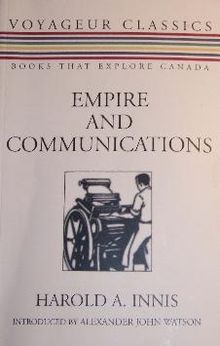On this date in 1903 President Theodore Roosevelt sent a radio message to King Edward VII in the first transatlantic radio transmission originating in the United States.
Frye on Harold Innis and communication theory in “Across the River and Out of the Trees”:
It is no great credit to me that I entirely missed the significance, at the time, of the later prose work of Harold Innis, which appeared around 1950-52. I found the prose style impenetrable and the subject-matter uncongenial. But, of course, as is widely recognized now, Innis was defining a central issue in the Canadian imagination which ultimately affected the interests of practically everyone concerned with words. Innis had first, as an economist, studied the fur trade and the fishing industry, and had gained from the study a vision of the “Laurentian” centrifugal economic development of the country, with the traders and trappers fanning out from the Great Lakes into the far North. This in turn provided him with the underlying pattern of the primary modes of communication in Canada, the network of railways and canals mentioned above. After that he asked himself the fateful question, “OK, what happens next?” This took him into a panoramic vision of secondary communication through words, as conveyed by papyrus, paper, parchment, clay bricks, manuscripts, books, and newspapers. He saw that verbal communication was an essential instrument of power, and that an ascendant class will naturally try to control and monopolize it. In Empire and Communications, and in the more accessible essays in The Bias of Communication, he sketched the outlines of a philosophy of history, based on the theme of the production and the control of the means of communication, on a scale as comprehensive, at least potentially, as anything since Marx. (CW 12, 558-9)
